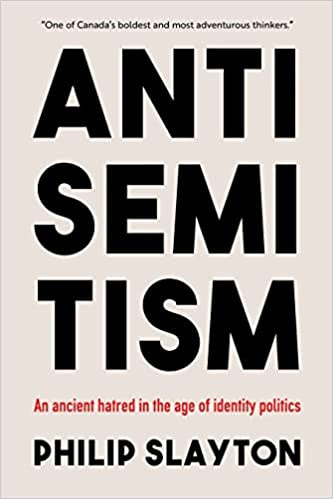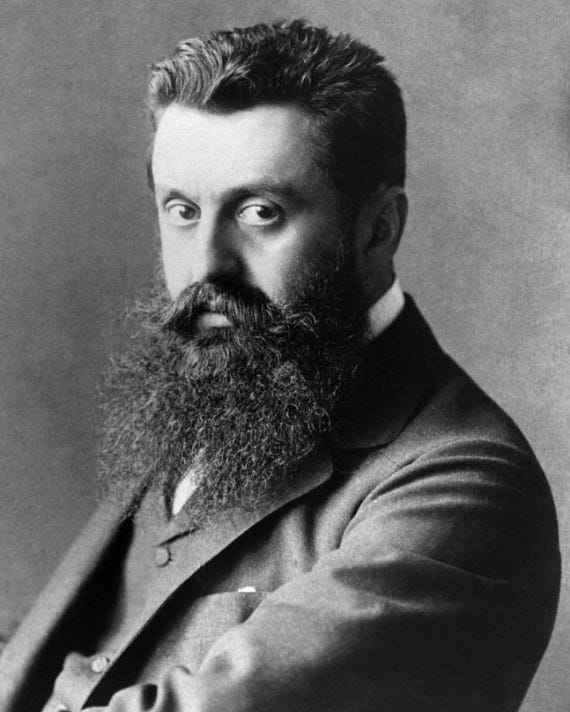The Endgame
Newsletter #15 - Lonely and depressed
The Endgame has taken a detour for a couple of weeks. My new book—Antisemitism: An ancient hatred in the age of identity politics—was published in Canada on March 7. You can order it from the publisher, Sutherland House, or from Ben McNally Books, or buy it at the usual places. Visit my website. And take a look at my discussion of the nature and sources of antisemitism in March 11 edition of The Globe and Mail.
Here are two brief excerpts from the new book to whet your appetite.
Toronto, March 12, 2023
Lonely and depressed
Theodor Herzl—charismatic, depressed, lonely, and beautiful (so he was described by contemporaries, and photographs bear out this description)—created the political arm of the Zionist movement in 1896 with the publication of his famous (but dull) pamphlet Der Judenstaat. It is interesting that it took so long for Jews to see the importance of organizing politically. Right from the start, more than a thousand years before, Mohammed knew it was essential, and proved himself to be, not just a charismatic religious leader, but also an astute politician and military man. But not all Jews saw the importance of independent political action. Herzl’s ideas were unpopular with many western Jews who thought they had assimilated into their local community and had no interest in Zionism upsetting the applecart.
Herzl’s Zionism was encouraged by his presence as an Austrian journalist at the 1894 trial for treason of the Jewish French army officer Alfred Dreyfus. In 1897 Herzl convened the first World Zionist Congress, held in the municipal casino of Basle, Switzerland, to consider his views and proposals. There, in a Swiss casino, was born the World Zionist Organization. Herzl’s purpose was to answer the so-called Jewish Question, that of the status of the Jews as a people in an age of raging political nationalism and new nation states. His vision was creation of a secular state that offered not only a refuge to Jews, but also a secure and honoured place to Arabs and equal rights for women. Herzl, I think, would be repelled by today’s discriminatory treatment of Palestinians by Israel. He was not interested in religion; indeed, in the early days the Zionist movement was antireligious and inclusive of all faiths. He was not anti-Arab.
Herzl died in July 1904, in Vienna, at the age of forty-four. Stefan Zweig described his funeral grandiosely and perhaps inaccurately (it is doubtful that a million people attended):
…people arrived at all the Viennese railway stations, coming with every train by day and night, from all lands and countries; Western, Eastern, Russian, Turkish Jews—from all the provinces and small towns they suddenly stormed in… the leader of a great movement was being carried to his grave… There was uproar in the cemetery itself; too many mourners suddenly poured like a torrent up to his coffin, weeping, howling and screaming in a wild explosion of despair. There was an almost raging turmoil… I could tell for the first time from all this pain, rising in sudden great outbursts from the hearts of a crowd a million strong, how much passion and hope this one lonely man had brought into the world by the force of his ideas.
Theodor Herzl
********
Theodor Herzl, the founder of Zionism, wrote, long before the creation of Israel: “If the Jews ever ‘returned home’ one day, they would discover on the next that they do not belong together. For centuries they have been rooted in diverse nationalisms; they differ from each other, group by group. The only thing they have in common is the pressure holding them together.” The Jewish Romanian novelist Mikhail Sebastian asked, writing in the 1930s, “One day – who knows – we may make peace with the anti-Semites. But when will we make peace with ourselves?” In 2021 Patrick Kingsley of The New York Times made a trip across Israel with photojournalist Laetitia Vancon. He reported: “We found a country still wrestling with contradictions left unresolved at its birth, and with the consequences of its occupation of the West Bank and Gaza in 1967. We found a people facing complex questions about what it means to be Israeli, or a Palestinian citizen of Israel. And we found a battle of narratives — waged not only between Jews and Arabs, but also among Jews themselves. Israel’s founders hoped to create a melting pot, a society that blended diverse communities into a single Jewish state. But we encountered an Israel that at times felt more like an unsolvable jigsaw puzzle — a collection of incompatible factions, each with its own priorities, grievances and history.” Some say there remains a pervasive racism in Israel towards Sephardic Jews. A 2021 film—The Forgotten Ones—by French-Israeli filmmaker Michale Boganim explores this subject. Says Boganim about Sephardic Jews, following a recent trip across Israel: “When I met these young people who live in Israeli projects I realized that what they’re going through, the way they have channeled that rage and developed an underground culture is similar to what children of immigrants are doing in many countries around the world, for instance in the U.S. or France. This is when I realized how universal the immigrant experience is.”




As we are about to witness the two year anniversary of October 7th, I wonder, as I often have, what your thoughts are on what unfolded and the Jewish state(s) of mind and Israel's standing on the world stage now. This book was published a few months before Oct.7th... is a follow up in the works?